06 December 2012
WASHINGTON — An anti-corruption group
says Brazil is making progress in fighting corruption while China is
passing some laws that eventually might ease the problem. These nations
were the exception to Transparency International's assessment that efforts to fight corruption are stalled or losing ground in many cases.
Cambodian motorcycle taxi driver Chum Van says it is just not fair. He said police sometimes put the blame for accidents on poor people, regardless of who is at fault.
Nigerian tailor Ukudi Nawa said corrupt officials make it hard to even turn on the lights. “So that really has a negative impact of my business because it makes me spend more.”
Cambodian motorcycle taxi driver Chum Van says it is just not fair. He said police sometimes put the blame for accidents on poor people, regardless of who is at fault.
Nigerian tailor Ukudi Nawa said corrupt officials make it hard to even turn on the lights. “So that really has a negative impact of my business because it makes me spend more.”
And she said it angers customers when she then has to raise prices to pay for a generator.
Nigeria and Cambodia are among 176 nations studied by Transparency International, which found serious official corruption in two-thirds of the countries.
Transparency's Huguette Labelle said the newest study of bribery and other abuses shows few nations improving.Nigeria and Cambodia are among 176 nations studied by Transparency International, which found serious official corruption in two-thirds of the countries.
"We have hundreds of millions of people around the world who face daily extortion, and in some countries it can be 50 percent of the population had to pay a bribe to gain access to essential services like water, education, health," she said.
Labelle said transparency is a key tool in fighting corruption, and praises Brazil for publishing a daily account of government spending that make it harder to hide abuses. She said the nation also is working on tougher laws to stop corrupt actions by elected officials.
She said China has been prosecuting people on corruption charges, and passing new anti-corruption laws.
"They [the Chinese] have been taking a lot of steps, I think now we will see if it has an impact on reducing corruption," said Labelle.
The report lists nations from least to most corrupt. China ranked 80th from the best, Brazil was 69th.
Denmark, Finland, and New Zealand were the least corrupt nations. The United States ranked 19th, which is behind some other wealthy democracies.
That worries Alan Larson, the head of the U.S. Chapter of Transparency International. "I think Americans need to be alarmed and be demanding a response to the fact that 18 countries around the world are seen as having greater integrity built into their institutions and less corruption built into their institutions," he said.
The worst corruption scores were earned by Somalia, North Korea and Afghanistan.
"I think that something for the government to really address and come up with novel methods of fighting corruption so we can get people’s trust and international community," said Afghanistan's Minister of Commerce, Anwar-Ul Haq Ahadi.
While complaints about corruption helped spark the Arab Spring uprisings that toppled governments in the Middle East, the report shows the drastic step of changing leadership has not ended corruption.
Transparency International bases its annual report on perceptions of corruption on multiple sources of information from businesses, international organizations, and experts around the world.

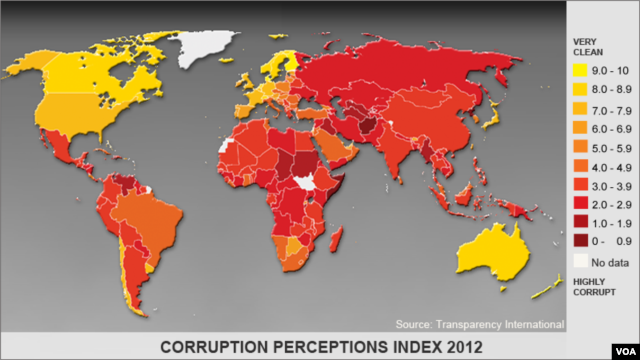
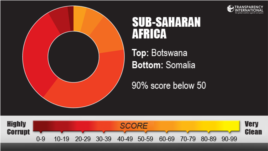
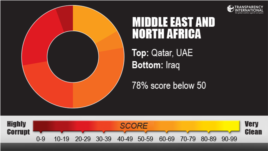
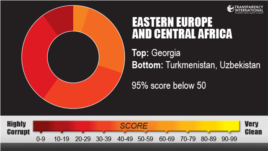
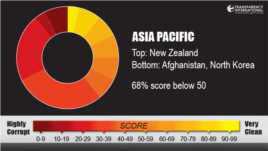
No comments:
Post a Comment